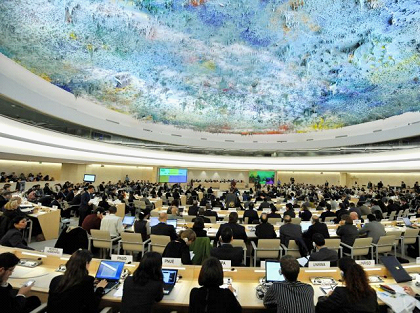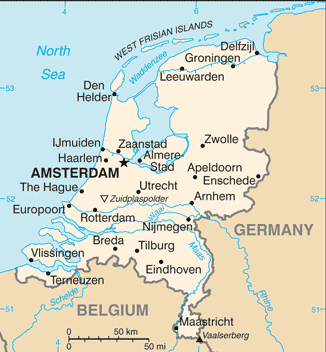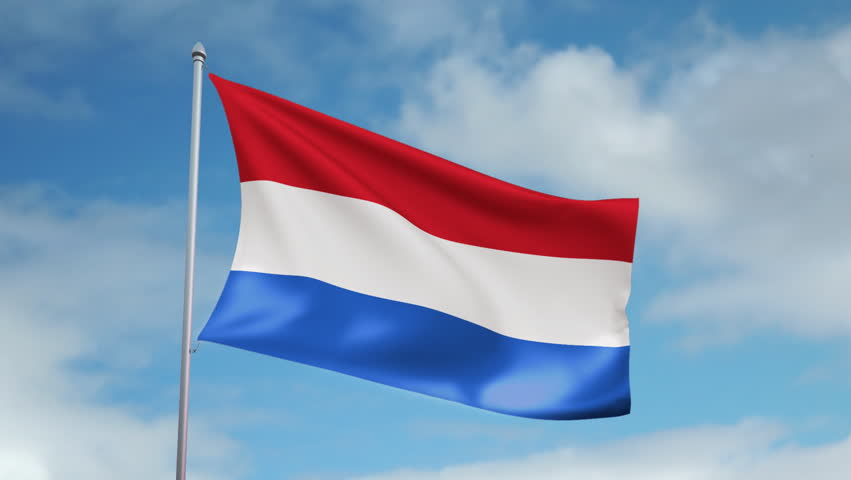UPR – Third Report of the Netherlands
On May 10, 2017, Mr. Ronald Plasterk presented the third national report of the Universal Periodic Review of the Kingdom of the Netherlands on the latest developments regarding its human rights commitments and application of previous recommendations.
The third report was prepared after inclusive consultations with governmental agencies and civil society and included the measures taken to implement the recommendations of the second UPR.
Presentation of the National Report

During the presentation of the third national report, Mr. Plasterk outlined the status of implementation of the recommendations made during the UPR session of 2012 and identified the main challenges faced by the government in the promotion and protection of human rights.
Human rights infrastructure: The Netherlands created a National Action Plan on Human Rights in 2013, which sets out the ways in which the government can fulfill its responsibility to protect and promote human rights in the Netherlands. Five specific policy themes are discussed in the Action Plan: “non-discrimination and equal treatment”, “information society”, “immigration and asylum”, “physical integrity and personal liberty” and “education, employment and culture”.
Monitoring of human rights at the national level: The Netherlands Institute for Human Rights was founded in October 2012, and was awarded the so-called “A” status in May 2014, which means it fully complies with the Paris Principles. Also in Curaçao, the Ombudsman Curaçao and the Ministry of Social Development, Labour and Welfare have jointly taken concrete steps towards setting up a Children’s Ombudsman for the country.
International human rights conventions and protocols: On 14 June 2016, the Netherlands ratified the Convention on the Rights of Persons with Disabilities. The Convention entered into force in respect of the Netherlands on 14 July 2016. Aruba is now mapping the consequences of the Convention’s entry into force in order to prepare for its approval.
Human rights at the local level: Youth care, long-term care and employment support were transferred to municipalities on 1 January 2015, and local authorities have acquired new tasks and responsibilities.
Business and human rights: In 2013, the Netherlands was one of the first countries to adopt a National Action Plan on Business and Human Rights to implement the UN Guiding Principles
Equality and non-discrimination: The Dutch Government presented a new National Action Programme to combat discrimination in all its forms on 22 January 2016.
Labour market discrimination: The government presented an Action plan against labour market discrimination on 16 May 2014. The action plan lists 48 concrete measures to tackle labour market discrimination.
UN Decade for People of African Descent: The government has drawn up a framework memorandum presenting a common vision on the details and implementation of policy arising from this Decade for People of African Descent (2015–2024) in the Netherlands. The memorandum follows the three pillars of the Decade: recognition, justice, and development.
The prevention of ethnic profiling: The police launched the three-year programme ‘The power of difference’ in 2015. The actions taken to prevent ethnic profiling focus on education and training, fostering good relations, diversity in the work force, and efforts to improve the complaints procedure.
Women’s rights: Between 2008 and 2014, the pay gap in the public sector decreased from 16% to 10% and in the private sector from 22% to 20%. The government set a target to have at least 30% of top positions in the central government’s senior civil service held by women by 2017. This target was met in 2015 and the current number is 33.3%.
LGBTI: On 16 January 2017, a draft bill was submitted by parliament to clarify discrimination on the grounds of gender in the Equal Treatment Act, so it would thereafter include physical sexual characteristics, gender identity and gender expression.
Rights of the Child: The new Youth Act (1 January 2015) provides that municipalities must actively involve young people and families in framing youth policy. The Netherlands also drafted an Action Plan to prevent and combat child sex tourism for the period 2016–2018.
Immigration, integration and asylum: In 2015, the Netherlands found itself dealing with an influx of asylum seekers that was unprecedented for this country. Not a single asylum-seeker was left without shelter during this peak influx.
Human rights and counterterrorism: The government adopted the Action Programme Integrated Approach to Jihadism to combat and weaken the jihadist movement in the Netherlands and to oppose radicalisation.
Freedom of expression: In 2017, a covenant will be concluded between the Public Prosecution Office, the police and anti-discrimination organisations to promote cooperation in this area. Also in 2017, a public awareness campaign against hate speech on the Internet will be launched.
While concrete efforts are being made, the Kingdom of the Netherlands continues to face several challenges and obstacles that hinder the full implementation of all recommendations. Such challenges include an increased politicised exploitation of human rights issues, including immigration and asylum, and the growing danger of extremism and terrorism.
During the third Universal Periodic Review, the Compilation of UN information and the Summary of stakeholders' information drafted by the OHCHR were also taken into consideration. During the session, Member States drew from such compilations and made their recommendations to the Kingdom of the Netherlands.
Compilation of the Office of the United Nations High Commissioner for Human Rights
This compilation included information contained in the reports of treaty bodies and special procedures and other relevant United Nations documents.
It was recommended that the Netherlands ratify the International Convention on the Protection of the Rights of All Migrant Workers and Members of Their Families, the Optional Protocol to the Convention on the Rights of the Child on a communications procedure,the Optional Protocol to the International Covenant on Economic, Social and Cultural Rights and the Optional Protocol to the Convention on the Rights of Persons with Disabilities.
OHCHR assessment of the implementation of the recommendations and the international human rights obligations
 Equality and non-discrimination: CERD was concerned about the increase in discrimination against members of Jewish and Muslim communities and in discrimination faced by people of African descent and stated that the General Equal Treatment Act must protect against discrimination based on language and ethnic origin.
Equality and non-discrimination: CERD was concerned about the increase in discrimination against members of Jewish and Muslim communities and in discrimination faced by people of African descent and stated that the General Equal Treatment Act must protect against discrimination based on language and ethnic origin.
Development, the environment, and business and human rights: CRC recommended that the Netherlands establish a clear regulatory framework for the industries under its jurisdiction to ensure that their activities, both at home and abroad, did not negatively affect human rights or endanger environmental and other standards.
Civil and political rights
Right to life, liberty and security of person: The Committee on Enforced Disappearances urged the Netherlands to investigate the disappearance of unaccompanied children from asylum reception centres and to search for and identify those children who might have been the victims of enforced disappearance. The Committee recommended that the definition of enforced disappearance in the International Crimes Act be reviewed to ensure that it was fully compliant with the Convention for the Protection of All Persons from Enforced Disappearance.
Administration of justice, including impunity, and the rule of law: The Committee against Torture recommended that the use of pretrial detention be reduced and used as a measure of last resort.
Fundamental freedoms: UNESCO noted that defamation was criminalized and recommended that it be decriminalized and placed within the civil code.
Prohibition of all forms of slavery: The Committee against Torture recommended that the Netherlands prevent and promptly, thoroughly and impartially investigate, prosecute and punish human trafficking
Right to family life: The Committee on the Rights of the Child urged the Netherlands to end “baby boxes” which allow the anonymous abandonment of children.
Economic, social and cultural rights
Right to an adequate standard of living: CRC was concerned about significant cutbacks in the budget that affected families and children living on minimum incomes.
Right to health: CRC recommended that measures be taken to prevent infant mortality by providing effective and quality neonatal and other care services for infants.
Right to education: CRC was concerned about the significant number of children from lower socioeconomic backgrounds and single-parent families who dropped out from secondary school.
Rights of specific persons or groups
Women: CEDAW called for the realization of substantive gender equality throughout the process of implementation of the 2030 Agenda for Sustainable Development and recommended that the Netherlands ensure that prosecutors and police were properly trained to identify, investigate and prosecute cases of gender based violence.
Children: CRC recommended that national legislation address all forms of violence, and explicitly prohibit corporal punishment in all settings. CRC also urged the Netherlands to amend the laws relating to the juvenile justice system to ensure that all children below the age of 18 years were treated under the juvenile justice laws.
Persons with disabilities: CRC urged the Netherlands to adopt a human rights-based approach to disability, set up a comprehensive strategy for the inclusion of children with disabilities, ensure sufficient places for all children with disabilities in the mainstream education system.
Minorities: CERD recommended that specific measures be taken in favour of Roma, Sinti and Travellers. The Working Group of Experts on People of African Descent concluded that targeted policies and affirmative action policies should be adopted to promote effective equality of people of African descent.
Migrants, refugees and asylum seekers: CERD recommended that the Netherlands ensure that undocumented migrants were provided with food and shelter, as appropriate, in all circumstances prior to deportation, and that they were granted the right to obtain health care in all constituent parts of the country. UNHCR recommended that asylum requests from unaccompanied minors be dealt with efficiently and rapidly and that family reunification requests be processed in an expeditious manner.
Stateless persons: UNHRC recommended that the Netherlands include in the proposed legislation a provision to grant a residence permit to persons recognized as stateless.

Summary of stakeholders’ submissions on the Netherlands drafted by the OHCHR
The summary was prepared by the OHCHR taking into consideration 18 stakeholders’ submissions to the universal periodic review.
Stakeholders’ assessment of the implementation of the recommendations and the international human rights obligations
Equality and non-discrimination: Several organisations noted that discrimination on the grounds of race, ethnicity, nationality, religion, gender, sexual orientation, gender identity and gender expression persist within public and private spheres.
Civil and Political Rights
Right to life, liberty and security of person: Concern was noted about legislation that allowed euthanasia of children between ages of 12 and 18 years. One organisation stated the practice of euthanasia was not compatible with the right to life, right to health and freedom from discrimination.
Fundamental freedoms: One organisation stated public gatherings had been policed, including unlawful detention of peaceful protesters, confiscation of banners and bans prohibiting assemblies at particular locations.
Economic, Social and Cultural Rights
It was generally criticised that the Netherlands did not consider provisions of human rights treaties on economic, social and cultural rights to be directly applicable and binding at the national level.
Right to an adequate standard of living: Poverty disproportionally affected women more than men.
Right to health: One organisation stated the Government must increase access to medical abortion.
Right to education: Two organisations suggested the Government include human rights in state education.
Rights of specific persons or groups
Children: Concerns were raised about the negative impact of growing child poverty on the enjoyment of the rights of children and the occurrence of child abuse via domestic violence, through the social media or bullying at school.
Migrants, refugees and asylum seekers: concerned at the extensive use of administrative detention of asylum seekers and immigrants.

27th Session of the Universal Periodic Review
During the presentation of the third national report of the Netherlands, Mr. Platersk outlined the status of implementation of the recommendations made during the UPR session of 2012 and identified the main challenges faced by the government in the promotion and protection of human rights. Mr Platersk also acknowledged the necessity of having a firm human rights infrastructure, further noting that effective infrastructure must allow for individual redress in national legislation.
He stated that a number of policy measures have been taken since the last UPR Session in 2012, including a national three-year program to target discrimination in the police, which focusses on ethnic profiling among other things. Furthermore, the Minister reiterated that gender inequality remains a priority of Dutch government. He noted that women have been encouraged to increase their working hours, and today, one in three of the top positions in the government are held by women.
Turning to refugees, Mr. Platersk stated that the Netherlands have undertaken many measures since 2015, when there were a vast increase of asylum seekers in the Netherlands, with the highest priority of the government to ensure that they could all be accommodated in a humane fashion. Dealing with this, he stated that the Netherlands had ensured not one asylum seeker was left without shelter. Finally, Mr Platersk restated how committed the Netherlands is to the UPR, and will take recommendations put forward very seriously - as the success of cycle comes down to implementation of the recommendations made.
The introductory remarks were followed by interventions of Member States which, after welcoming the delegation of the Netherlands, and commending the efforts made to fully implement the recommendations of the previous UPR session, made a number of recommendations.
Initially Member States commended the Netherlands on their commitment to human rights, and their 2013 National Action Plan to combat discrimination. However, many states recommended that the Netherlands should ratify The Convention on Rights of all Migrant Workers and their Families. Furthermore, several countries, including Egypt, Azerbaijan, Argentina, the USA and Uganda, urged the Netherlands to take more action towards racial and ethnic discrimination, hate speech emanating from political parties, and the harassment of ethnic minorities. Other countries, such as Ghanda and Turkey also noted the increasing appearance of hate speech online. Finally, Spain and Azerbaijan criticised the continuance of ethnic profiling in the Netherlands.
Replying to some of the questions and the remarks raised by Member States, Mr Plasterk stated that concrete action has been taken on hate speech, especially online. He noted that an independent hotline has been set-up regarding hate speech on the internet and that the government had established a broad anti-discrimination campaign which included online hate speech. He further established that the Netherlands has no intention to ratify the Convention on Migrant Workers, as the Netherlands is opposed to the idea that there is no difference between aliens and residents who have legal rights. Finally, he reiterated that ethnic profiling is not allowed in the Netherlands, and that the police had adopted a code in the last month to prevent this, which includes a professional standard and guidance for how to act in situations when they must stop citizens.
Adoption of the Draft Report of the Working Group on the Universal Periodic Review
On Friday May 12, 2017, the Working Group on the Universal Periodic Review adopted the Report on The Netherlands. The delegation of the Netherlands will examine the 203 recommendations and will provide its responses no later than the thirty-sixth session of the Human Rights Council in September 2017.
النص بالعربية: هنا
Links to GICJ reports on the UPR reviews of:
|
|
|
|
|
|




